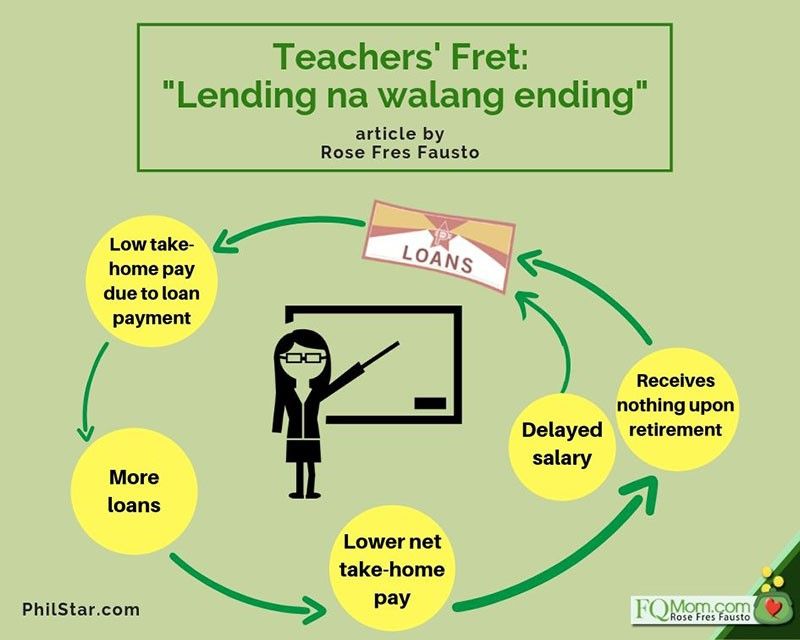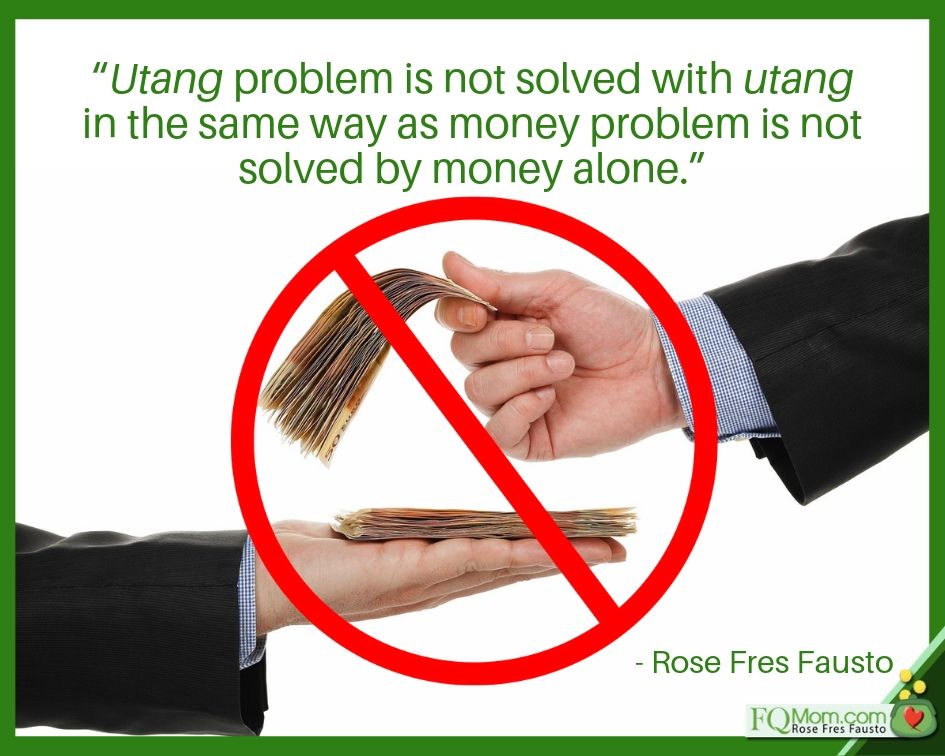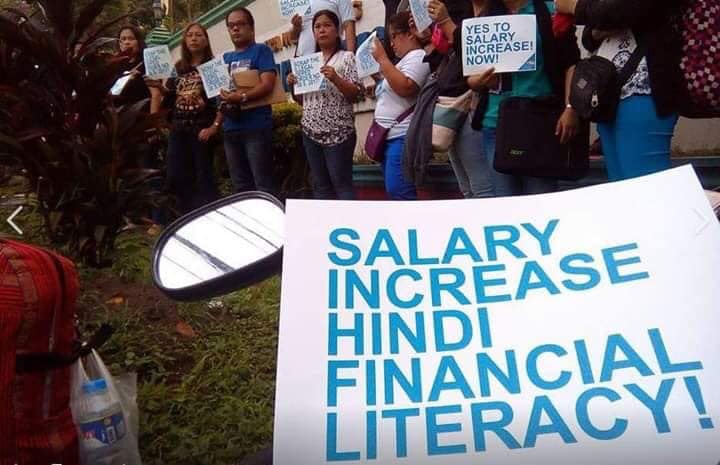Teachers’ fret: 'Lending na walang ending'


Were you a teacher’s pet back in your school days? Did you have a teacher who really inspired you and somehow contributed to what you have become today?
Teachers really play a big part in molding a country’s citizens and because of this, we have to make sure that their well-being is taken care of if we want a prosperous nation. But what is the current status of our teachers? Particularly, our public school teachers.
Last Saturday, I was one of the guests at Jing Castaneda’s show on DZMM to discuss the financial situation of our teachers. Other guests were GSIS Executive Vice President for Core Business Center Nora Malubay, and Alliance of Concerned Teachers national chairperson Jocelyn Martinez. To watch the full interview, click here.
 From L-R: Jing Castaneda, the author FQ Mom, GSIS Executive Vice President for Core Business Center Nora Malubay, and Alliance of Concerned Teachers national chairperson Jocelyn Martinez
From L-R: Jing Castaneda, the author FQ Mom, GSIS Executive Vice President for Core Business Center Nora Malubay, and Alliance of Concerned Teachers national chairperson Jocelyn MartinezWhat’s the situation?
1. According to ACT national chairperson Jocelyn, public school teachers are in a tight situation of not being able to make both ends meet. She cited the many expenses that a teacher has to pay for and said that their salary is really not enough. She calls on the president to grant salary increase to the teachers, because this is the solution to the problem.
2. In 2016 some 26,000 teachers did not receive any retirement benefits because they needed to pay their loans.
3. Public school teachers’ loans rose to almost P320 billion (P157.4 billion from GSIS and P162 billion from private lending institutions or PLIs). It is very likely that this is even understated because it does not yet include loans taken from the informal lending sector that charge exorbitant rates.
4. Department of Education Secretary Leonor Briones cited the study of the PIDS (Philippine Institute for Developmental Studies) on households showing that public school teachers are 50% more likely to borrow compared to other government employees.
5. My own data gathering revealed that private school teachers are not mired in this same problem.
Is salary increase the solution?
1. In the last 19 years, public school teachers received over 100% increase in salaries, 119.25% to be exact. A teacher level 1 who used to receive a monthly salary of P9,466 in 2000 now receives P20,754. If you include benefits, the effective monthly pay is P30,873.

Source: Philippine News Agency’s article entitled “Over 100% hike in teachers’ salaries in 10 years” published on June 9, 2019 at https://www.pna.gov.ph/articles/1071867
2. Public school teachers earn 30% more than their private school teacher counterparts, even as much as 50% in Mindanao area.
3. Private school teachers, especially fresh graduates who enter small schools, may receive as low as P12,000 per month.Private school teachers are not mired in debt in the same way that public school teachers are.
4. Teachers receive salaries even during summer break. That’s two months. I don’t know of any profession that has this perk.
5. Of course, I would be happy if our teachers would receive salary increase. However, given the above facts, the problem is obviously not the amount of salary. Hence, the solution is clearly not just salary increase, nor is it making more loans available to them. As I said during the interview, “ Utang problem is not solved with utang in the same way as money problem is not solved by money alone.”

Behavioral Economics (B.E.) please
As I researched more on this problem, it became very clear that the principles of Behavioral Economics should be used to solve this problem – both in the policies and in helping the teachers individually.
The teachers claim (and I agree) that they are not big spenders as they feel they may be perceived when this problem is tackled.They resist Financial Literacy as the solution.

Source: Total Financial Solution’s Facebook group post
So what’s peculiar about their situation that makes them mired in debt?
1. Their environment makes it so easy, if not attractive, to take on loans! That is the big problem. All they need to show is their pay slip and voila! They instantly get a loan. Both GSIS and PFIs make it so easy for them to take a loan. Some even give freebies. Even teachers who have not yet received their first pay check can already avail of a loan. The occurrence of delay in first pay check for new teachers also becomes their reason for starting their enslavement to lending na walang ending. ![]() Note that there are more than 200 PFIs accredited by the DepEd who visit schools regularly to peddle their loans. This alone shows that it’s a thriving market.
Note that there are more than 200 PFIs accredited by the DepEd who visit schools regularly to peddle their loans. This alone shows that it’s a thriving market.
2. From the point of view of the lenders, why are they so gung-ho in lending to teachers? They don’t have credit checks, no need to analyze credit ratios, repayment capability, maybe not even looking closely at the purpose of loan. Just show proof that you’re a public school teacher and that’s it. This is because the Department of Education is their efficient collecting agent and this is done through salary deduction! For lending institutions, this is heaven – loan repayment withheld at source! (According to ACT chair Jocelyn DepEd receives 1% collecting agent’s fee.)
3. There is now a prescribed minimum take home pay after all salary deductions including loan repayments. It is P5,000.00. What happens is that this amount has become the anchor number for them. It’s as if, teachers are encouraged to borrow to the extent that his net take home pay falls to P5,000.00! (To understand this Behavioral Economics principle, click Anchoring Effect).
4. And my golly! If you leave only P5,000.00 for a whole month’s expenses, you’re setting up our poor teachers to borrow again because that amount is definitely not enough. And so they borrow again, and again, and again. It’s a vicious cycle that buries them in debt quagmire!
5. When Sec. Briones suggested Financial Literacy to the teachers, there was a strong negative reaction. In fact, during my guesting last Saturday at the make-up room, when the teachers found out what I was there for there was a not so pleasant reaction, “Naku financial literacy na naman! Ma’am matanong ko kayo, ‘Magkano ho ba ang sueldo nyo?’” But I was prepared for this so I said with a smile, “Uy, magandang pag-usapan natin kung bakit ganyan ang nararamdaman nyo. By the way, wala akong sueldo.” ![]() Fortunately, at the end of the show, the teacher who reacted negatively approached me to say, “Tama ka, structural/environment and problema!” I guess the stigma attached to financial literacy is quite B.E. in nature. Teachers are supposed to be our guides, our gurus for literacy and when we tell them that they lack financial literacy, they feel insulted. So maybe just a change in naming the solution might do wonders. I’ll have to get back to you for a more palatable term for this.
Fortunately, at the end of the show, the teacher who reacted negatively approached me to say, “Tama ka, structural/environment and problema!” I guess the stigma attached to financial literacy is quite B.E. in nature. Teachers are supposed to be our guides, our gurus for literacy and when we tell them that they lack financial literacy, they feel insulted. So maybe just a change in naming the solution might do wonders. I’ll have to get back to you for a more palatable term for this. ![]()
Our teachers’ financial condition needs a more thorough assessment. We have to show empathy and deep understanding of their situation. They complain of delay in salaries for the new teachers, lack of materials for their teaching and even school upkeep that they have to shell out their own money. They also do not send their own children to the schools where they teach because they feel that private schools give better education. Couple that with an environment that uses utang to solve their perceived low salary problem (a problem that is also experienced by other sectors but not caught in debt quagmire).
Offering them financial literacy alone will not work! I repeat, will not work! It’s a systemic problem. Different institutions put them in that situation. Any group of workers would put in their situation (I dare to say, even finance people) may also find themselves in a debt quagmire. Why? Because the human wiring, regardless of your profession, will succumb to the emotional and irrational limbic system. It will do what feels good in the short term, even if the rational pre-frontal brain knows what’s good for the long term. (Read Hyperbolic Discounting explained to a 7 year old to know more about this.)
Imagine yourself, in all your financially rational glory, feeling that you need a higher salary because you are just earning so much, and the options presented are:
1.) take a loan by just showing your salary slip or some biometrics method as stated by GSIS in the interview, and voila! you get an amount even reaching 6 figures right away; or
2.) List down all your expenses, figure out what you can cut on, find a way how to augment your existing salary, etc.
Option 1 is so much more attractive to our limbic brain. And so, you get into debt. My research shows that most of the time they do not bother to find out the effective interest rate, or how many lifetimes they need to have in order to pay out the loan. All they look at are the amount of loan they could get and the monthly amortization. They also don’t seem to have salient reminders of how much their total accumulated loans are, the cost of carrying these loans, and the number of lifetimes they need to become debt-free! All they know is as long as their net take home pay doesn’t go below P5,000, a really bad number to anchor on.
It is a complex situation that the system has put our poor teachers in, where it is so much easier to borrow like crazy, rather than save and invest little by little. Reading the stories of actual teachers make you want to cry. This has to be assessed carefully and decisively acted upon. The pros and cons of an amnesty should even be studied, the way we would give such pardons to tax evaders. All the necessary policies and infrastructure should be studied and implemented immediately in order to solve our teachers’ problem of “lending na walang ending.” ![]()
*********************************
ANNOUNCEMENTS
1. Mom and Son Podcast - Season 3 Episode 3 (Dani Mortel)
Today, we learn the story of VJ DaniMortel's journey as a lifestyle live streamer, commercial model and now a new Myx VJ! What does a live streamer do? We discuss her perspective on how to view one's job, finding one's self through the challenges she faces. She shares her struggles and mindset as a commercial model and many others.
#MomandSonPodcast

Spotify
https://open.spotify.com/episode/02iJWXzfVTja06j3lIEuri?si=i9y3GriPQBmrizPp960H_g
Apple iTunes
https://podcasts.apple.com/ph/podcast/mom-and-son-podcast/id1449688689?mt=2
Buzzsprout
https://www.buzzsprout.com/241447/1410994-mom-and-son-podcast-season-3-episode-3-dani-mortel
Google Podcasts
https://podcasts.google.com/?feed=aHR0cHM6Ly9mZWVkcy5idXp6c3Byb3V0LmNvbS8yNDE0NDcucnNz
YouTube
2. Thanks to those who already bought the FQ Book, especially to those who took the time out to send me their feedback. Your feedback is food for my soul. To those who have not gotten their copy yet, here’s a short preview of "FQ: The nth Intelligence."
You may now purchase the book in major bookstores, or if you want autographed copies, please go to FQ Mom FB page (click SHOP), or FQMom.com (click BOOKS), or email us at [email protected]
3. Want to know where your FQ stands? Take the FQ Test Challenge now! Click link: http://rebrand.ly/FQTest

Rose Fres Fausto is a speaker and author of bestselling books "Raising Pinoy Boys" and "The Retelling of The Richest Man in Babylon" (English and Filipino versions). Click this link to read samples – Books of FQ Mom. She is a behavioral economist, a certified Gallup strengths coach and the grand prize winner of the first Sinag Financial Literacy Digital Journalism Awards. Follow her on Facebook&YouTube as FQ Mom, and Twitter&Instagram as the FQMom. Her latest book is "FQ: The nth Intelligence."




















